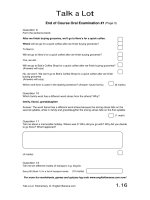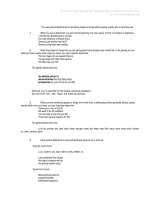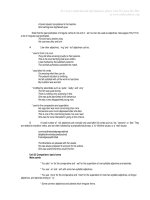Tài liệu Collins cobuild student grammar part 3 pdf
Bạn đang xem bản rút gọn của tài liệu. Xem và tải ngay bản đầy đủ của tài liệu tại đây (50.84 KB, 15 trang )
For more material and information, please visit Tai Lieu Du Hoc
at www.tailieuduhoc.org
* You use general determiners to talk about people or things without saying exactly who or what they are.
1 When you use a determiner, you put it at the beginning of a noun group, in front of numbers or adjectives.
I met the two Swedish girls in London.
Our main bedroom is through there.
Have you got another red card?
Several young boys were waiting.
2 When the people or things that you are talking about have already been mentioned, or the people you are
talking to know exactly which ones you mean, you use a specific determiner.
The man began to run towards the boy.
Young people don't like these operas.
Her face was very red.
The specific determiners are:
the definite article:the
demonstratives:this that these those
possessives:my your his her its our their
Note that `your' is used both for the singular and plural possessive.
See Unit 19 for `this', `that', `these', and `those' as pronouns.
3 When you are mentioning people or things for the first time, or talking about them generally without saying
exactly which ones you mean, you use a general determiner.
There was a man in the lift.
We went to an art exhibition.
You can stop at any time you like.
There were several reasons for this.
The general determiners are:
a, all, an, another, any, both, each, either, enough, every, few, fewer, less, little, many, more, most, much, neither,
no, other, several, some
4 Each general determiner is used with particular types of noun, such as:
* singular count nouns
a, an, another, any, each, either, every, neither, no
I got a postcard from Susan.
Any big tin container will do.
He opened another shop .
* plural count nouns
allenoughmanynosome
anyfewmoreother
bothfewermostseveral
For more material and information, please visit Tai Lieu Du Hoc
at www.tailieuduhoc.org
There were few doctors available.
He spoke many different languages.
Several projects were postponed.
* uncount nouns
all, any, enough, less, little, more, most, much, no, some
There was little applause.
We need more information
He did not speak much English.
WARNING: The following general determiners can never be used with uncount nouns.
a, an, another, both, each, either, every, few, many, neither, several
5 Most of the determiners are also pronouns, except `the', `a', `an', `every', `no' and the possessives.
I saw several in the woods last night.
Have you got any that I could borrow?
There is enough for all of us.
You use `one' as a pronoun instead of `a' or `an', `none' instead of `no', and `each' instead of `every'.
Have you got one?
There are none left.
Each has a separate box and number.
Unit 24 Main uses of `the'
Main points
* You can use `the' in front of any noun.
* You use `the' when the person you are talking to knows which person or thing you mean.
* You use `the' when you are referring back to someone or something.
* You use `the' when you are specifying which person or thing you are talking about.
* You use `the' when you are referring to something that is unique.
* You use `the' when you want to use one thing as an example to say something about all things of the same
type.
1 `The' is called the definite article, and is the commonest determiner. You use `the' when the person you are
talking to knows which person or thing you mean. You can use `the' in front of any noun, whether it is a singular count noun, an
uncount noun, or a plural count noun.
She dropped the can.
I remembered the fun I had with them.
The girls were not at home.
2 You use `the' with a noun when you are referring back to someone or something that has already been
mentioned.
I called for a waiter... ...The waiter with a moustache came.
I have bought a house in Wales... ...The house is in an agricultural area.
For more material and information, please visit Tai Lieu Du Hoc
at www.tailieuduhoc.org
3 You use `the' with a noun and a qualifier, such as a prepositional phrase or a relative clause, when you are
specifying which person or thing you are talking about.
I've no idea about the geography of Scotland.
The book that I recommended now costs over three pounds.
4 You use `the' with a noun when you are referring to something of which there is only one in the world.
They all sat in the sun.
We have landed men on the moon.
The sky was a brilliant blue.
You also use `the' when you are referring to something of which there is only one in a particular place.
Mrs Robertson heard that the church had been bombed.
He decided to put some words on the blackboard.
5 You can use `the' with a singular count noun when you want to make a general statement about all things of
that type. For example, if you say `The whale is the largest mammal in the world', you mean all whales, not one particular whale.
The computer allows us to deal with a lot of data very quickly.
My father's favourite flower is the rose.
6 You can use `the' with a singular count noun when you are referring to a system or service. For example, you
can use `the phone' to refer to a telephone system and `the bus' to refer to a bus service.
I don't like using the phone.
How long does it take on the train?
7 You can use `the' with the name of a musical instrument when you are talking about someone's ability to play
the instrument.
`You play the guitar, I see,' said Simon.
Geoff plays the piano very well.
Unit 25 Other uses of `the'
Main points
* You do not normally use `the' with proper nouns referring to people. You do use `the' with many proper nouns
referring to geographical places.
* You use `the' with some adjectives to talk about groups of people.
1 You do not normally use `the' with proper nouns that are people's names. However, if you are talking about a
family, you can say `the Browns'.
You use `the' with some titles, such as `the Queen of England', and with the names of some organizations, buildings,
newspapers, and works of art.
...the United Nations... ...the Taj Mahal...
...the Times... ...the Mona Lisa.
2 You do use `the' with some proper nouns referring to geographical places.
...the Bay of Biscay... ...the Suez Canal.
...the Arabian Gulf... ...the Pacific Ocean.
You use `the' with countries whose names include words such as `kingdom', `republic', `states', or `union'.
...the United Kingdom... ...the Soviet Union.
You use `the' with countries that have plural nouns as their names.
...the Netherlands... ...the Philippines.
For more material and information, please visit Tai Lieu Du Hoc
at www.tailieuduhoc.org
Note that you do not use `the' with countries that have singular nouns as their names, such as `China', `Italy', or `Turkey'.
You use `the' with names of mountain ranges and groups of islands.
...the Alps... ...the Himalayas.
...the Bahamas... ...the Canaries.
Note that you do not use `the' with the names of individual mountains such as `Everest' or `Etna', or the names of
individual islands such as `Sicily', `Minorca', or `Bali'.
You use `the' with regions of the world, or regions of a country that include `north', `south', `east', or `west'.
...the Middle East... ...the Far East.
...the north of England... ...the west of Ireland.
Note that there are some exceptions.
...North America... ...South-East Asia.
You do not use `the' with `northern', `southern', `eastern', or `western' and a singular name.
...northern England... ...western Africa.
You use `the' with the names of areas of water such as seas, oceans, rivers, canals, gulfs, and straits.
...the Mediterranean Sea... ...the Atlantic Ocean.
...the river Ganges... ...the Panama Canal.
...the Gulf of Mexico... ...the straits of Gibraltar.
Note that you do not use `the' with lakes.
...Lake Geneva... ...Lake Superior.
Note that you do not use `the' with continents, cities, streets, or addresses.
...Asia... ...Tokyo.
...Oxford Street... ...15 Park Street.
3 You use `the' with adjectives such as `rich', `poor', `young', `old', and `unemployed' to talk about a general
group of people. You do not need a noun.
Only the rich could afford his firm's products.
They were discussing the problem of the unemployed.
When you use `the' with an adjective as the subject of a verb, you use a plural verb.
In the cities the poor are as badly off as they were in the villages.
4 You use `the' with some nationality adjectives to talk about the people who live in a country.
They will be increasingly dependent on the support of the French.
The Spanish claimed that the money had not been paid.
With other nationalities, you use a plural noun.
...Germans... ...the Americans.
When you use `the' with a nationality adjective as the subject of a verb, you use a plural verb.
The British are worried.
5 You use `the' with superlatives.
He was the cleverest man I ever knew.
He was the youngest.
His shoulders hurt the worst.
It was the most exciting summer of their lives.
Unit 26 `A' and `an'
For more material and information, please visit Tai Lieu Du Hoc
at www.tailieuduhoc.org
Main points
* You only use `a' or `an' with singular count nouns.
* You use `a' or `an' to talk about a person or thing for the first time.
1 You only use `a' or `an' with singular count nouns. `A' and `an' are called the indefinite article.
I got a postcard from Susan.
He was eating an apple.
Remember that you use `a' in front of a word that begins with a consonant sound even if the first letter is a vowel, for
example `a piece, a university, a European language'. You use `an' in front of a word that begins with a vowel sound even if the first
letter is a consonant, for example `an exercise, an idea, an honest man'.
2 You use `a' or `an' when you are talking about a person or thing for the first time.
She picked up a book.
After weeks of looking, we eventually bought a house.
A colleague and I got some money to do research on rats.
Note that the second time you refer to the same person or thing, you use `the'.
She picked up a book... ...The book was lying on the table.
After weeks of looking, we bought a house... ...The house was in a village.
3 After the verb `be' or another link verb, you can use `a' or `an' with an adjective and a noun to give more
information about someone or something.
His brother was a sensitive child.
He seemed a worried man.
It was a really beautiful house.
You can also use `a' or `an' with a noun followed by a qualifier, such as a prepositional phrase or a relative clause, when
you want to give more information about someone or something.
The information was contained in an article on biology.
I chose a picture that reminded me of my own country.
4 You use `a' or `an' after the verb `be' or another link verb when you are saying what someone is or what job
they have.
He became a school teacher.
She is a model and an artist.
5 You use `a' or `an' to mean `one' with some numbers. You can use `a' or `an' with nouns that refer to whole
numbers, fractions, money, weights, or measures.
a hundred, a thousand, a quarter, a half, a pound, a dollar, a kilo, a litre
6 You do not use `a' or `an' with uncount nouns or plural count nouns. You do not need to use a determiner at all
with plural count nouns, but you can use the determiners `any', `a few', `many', `several', or `some'.
I love dogs.
Do you have any dogs?
Many adults don't listen to children.
I have some children like that in my class.
Note that if you do not use a determiner with a plural count noun, you are often making a general statement about people
or things of that type. For example, if you say `I love dogs', you mean all dogs. However, if you say `There are eggs in the kitchen',
you mean there are some eggs. If you do use a determiner, you mean a number of people or things but not all of them, without
saying exactly how many.
For more material and information, please visit Tai Lieu Du Hoc
at www.tailieuduhoc.org
I have some friends coming for dinner.
He has bought some plants for the house.
I have some important things to tell them.
Unit 27 All, most, no, none
Main points
* You use `all' with plural count nouns and uncount nouns. You use `all' to talk about every person or thing in
the world, or in the group you are talking about.
* You use `most' with plural count nouns and uncount nouns. You use `most' to talk about nearly all of a
number of people or things, or nearly all of a quantity of something.
* You use `no' with singular and plural count nouns and uncount nouns. You use `no' to say that something
does not exist or is not present.
1 You use `all' with plural count nouns and uncount nouns to talk about every person or thing in the world or in
the group that you are talking about.
All children should complete the primary course.
All important decisions were taken by the government.
He soon lost all hope of becoming a rock star.
All luggage will be searched.
2 You use `most' with plural count nouns and uncount nouns to talk about nearly all of a number of people or
things, or nearly all of a quantity of something.
The method was suitable for most purposes.
Most good drivers stop at zebra crossings.
Most milk is still delivered to people's houses.
He ignored most advice, and did what he thought best.
3 You use `no' with singular count nouns, plural count nouns, and uncount nouns to say that something does not
exist or is not present.
There was no chair for me to sit on.
They had no immediate plans to change house.
No money was available for the operation.
Note that if there is another word in the clause that makes it negative, you use `any', not `no'.
It hasn't made any difference.
He will never do any work for me again.
4 `All' and `most' are also pronouns, so you can say `all of' and `most of'. `No' is not a pronoun, so you must say
`none of'.
He spent all of the money on a new car.
Most of my friends live in London.
None of those farmers had ever driven a tractor.
Note that you use `all of', `most of', and `none of' with an object pronoun.
All of us were sleeping.
I had seen most of them before.
None of them came to the party.
Note that if the clause is already negative, you use `any of', not `none of'.
I hadn't eaten any of the biscuits.
When `none of' is followed by a plural count noun or pronoun, the verb is usually plural, but can be singular.
None of us are the same.









